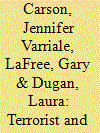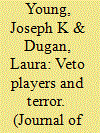| Srl | Item |
| 1 |
ID:
112618


|
|
|
|
|
| Publication |
2012.
|
| Summary/Abstract |
Despite concerns about the growing threat posed by domestic radical environmental and animal rights groups to the United States, there has been little systematic quantitative evidence depicting the characteristics of their attacks over time. In this paper we analyze data on 1,069 criminal incidents perpetrated by environmental and animal rights extremists from 1970 to 2007. Based on the Global Terrorism Database's definition of terrorism, we classified 17 percent of these incidents as terrorist. To supplement the analysis, we also conducted interviews with a nonrandom sample of twenty-five activists who self-identified as part of the environmental or animal rights movements. We find that overall, the attacks staged by radical environmental and animal rights groups thus far have been overwhelmingly aimed at causing property damage rather than injuring or killing humans. Further, results from our interviews suggest that activists appear to weigh carefully the costs and benefits of illegal protest. Despite the fact that attacks by environmental and animal rights groups have thus far been almost universally nonviolent, concerns linger that this situation might change in the future.
|
|
|
|
|
|
|
|
|
|
|
|
|
|
|
|
| 2 |
ID:
102506


|
|
|
|
|
| Publication |
2011.
|
| Summary/Abstract |
Democratic regimes have been linked to terrorism for contending reasons, with some scholars claiming democracy increases terrorism and others claiming it decreases terror. Corroborating evidence has been used for both relationships leading to the following puzzle: why do some democratic regimes seem to foster terrorism while others do not? We offer an explanation based on Tsbelis's veto players theory. Beginning with the assumption that terror groups want to change government policy, we argue that the more veto players present in a political system, the more likely the system is to experience deadlock. Given the inability of societal actors to change policies through nonviolent and institutional participation, these systems will tend to generate more terror events. We also explore different methods for estimating terrorism models. We identify several ways to match the data with the proper statistical estimator and discuss implications for terrorism research. Finally, we use new data from the Global Terrorism Database (GTD) that was previously unavailable. These data allow us to use different operational definitions of terrorism and to identify homegrown terror events.
|
|
|
|
|
|
|
|
|
|
|
|
|
|
|
|